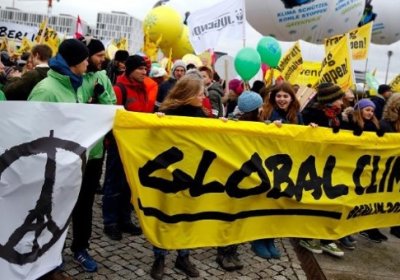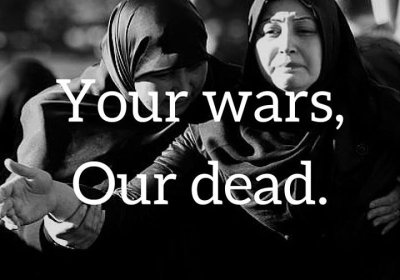There has been plenty of heat this Palestinian winter in the campaign for Boycott, Divestment and Sanctions (BDS) against Israel.
There have been some important victories, helped by the increased scrutiny of Israeli state violence since October. And equally, the hysteria from Israeli and Western political establishments over the “threat” posed by the BDS campaign has reached new levels.
France
 “Stop the blackmail: Anti-Zionism is not anti-Semitism.” Paris, July 2014.
“Stop the blackmail: Anti-Zionism is not anti-Semitism.” Paris, July 2014.
Even with protests banned in Paris ahead of the United Nation's COP21 climate talks, about 2300 climate protests sent a global message to leaders at the talks.
Hundreds of thousands of people joined climate change protests, marches and other events around the world on November 29 to send a message to leaders on the eve of COP21 that the world is waiting for climate change action. The 2300 climate actions included 175 countries.
British parliament sat late into the night on December 2 before eventually voting up Prime Minister David Cameron's proposal to join the US-led air war in Syria.
Opposition Labour Party leader and veteran anti-war activist Jeremy Corbyn argued strongly against bombing Syria, as did protesters outside parliament. However, many right-wing Labour MPs supported the government.
If the horrific attacks in Paris, France have taught us anything, it is that some tragedies matter more than others.
For example, look no further than these headlines:
• 120 Dead in Paris Attacks, Worst Since WWII (ABC/AP, November 14);
• Paris Wakes Up Under Siege After Deadliest Attack Since WWII (The Daily Beast, November 14);
Since the terrorist attacks in Paris on November 13, the world's leaders and media have predictably reminding the world that the attacks' perpetrator – ISIS – has declared war to the death against humanity.
ISIS would not deny this. Indeed, making this point was the reason it carried out the Paris attacks, which killed 129 people.
As the initial horror and outrage of the attacks in Paris on November 13 subside, the impacts they are already having on French and European society are becoming clearer.
A state of emergency has been declared by the French government and will persist for up to three months.
French officials announced on November 17 that France would see an extra 115,000 police officers, gendarmes and soldiers deployed across the country.
In this context, rational debate is being restricted and progressive movements are on the defensive.
Refugees
The Socialist Alliance and its youth wing, Resistance, expresses our solidarity with the people of Paris and Beirut who were targeted in back-to-back acts of terror by ISIS forces in the past few days.
As news arrived yesterday of terror attacks in Paris that ultimately left more than 120 people dead, US President Barack Obama characterized the situation as “heartbreaking” and an assault “on all of humanity.”
But his presidential sympathy was conspicuously absent the previous day when terror attacks in Beirut left more than 40 dead. Predictably, Western media and social media were much less vocal about the slaughter in Lebanon.
 30,000 people marched in Vienna on August 31 to demonstrate against inhumane treatment of refugees.
In less than a fortnight a series of tragedies took place on the borders of Europe, spurring a continent-wide debate over refugee policy.
On August 26, about 200 refugees perished at sea as their ship capsized off the coast of Libya on its way to Italy.
30,000 people marched in Vienna on August 31 to demonstrate against inhumane treatment of refugees.
In less than a fortnight a series of tragedies took place on the borders of Europe, spurring a continent-wide debate over refugee policy.
On August 26, about 200 refugees perished at sea as their ship capsized off the coast of Libya on its way to Italy.
 Syrian refugees on Greece-Macedonia border. Photo: Amnesty International.
“Are we animals? Why? Why?”
Those were the words of one Syrian refugee to BBC's Channel 4 recently after Macedonian police attacked desperate families seeking entry into the country along the border with Greece.
The refugee crisis has grown to immense proportions. Tens of thousands of people have flooded into the Balkans in recent weeks.
Macedonia
Syrian refugees on Greece-Macedonia border. Photo: Amnesty International.
“Are we animals? Why? Why?”
Those were the words of one Syrian refugee to BBC's Channel 4 recently after Macedonian police attacked desperate families seeking entry into the country along the border with Greece.
The refugee crisis has grown to immense proportions. Tens of thousands of people have flooded into the Balkans in recent weeks.
Macedonia
In the aftermath of the harsh deal for brutal austerity and mass privatisation imposed on Greece in the early hours of July 13, both Berlin and Paris are floating alternative “solutions” to the euro problem.
Germany, on the one hand, wants greater fiscal integration, whereas France is calling for the creation of a eurozone government as well as a dedicated finance minister.
The mainstream press is talking up the divisions between the two nations as fundamentally different perspectives on the euro — or even differences in political “culture”.
- Previous page
- Page 10
- Next page








